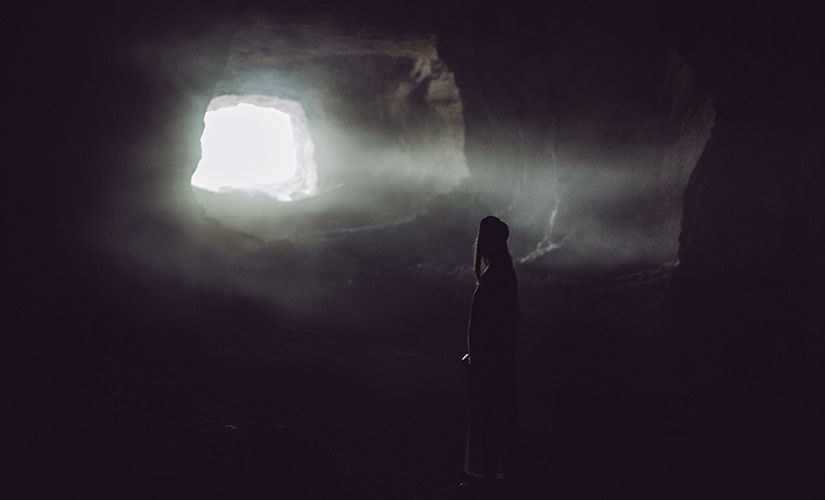It’s Easter morning, and I’m tucked in between my mother and father on the church pew, shivering a bit from the walk through the spring rain. I feel the swell of the organ as the voices of the congregation rise around me in rich harmonies. The joyous fervor of their singing captures me and draws me in. A feeling I can’t explain transcends my childish delight in the plush bunny I am clutching, the chocolate eggs waiting in my Easter basket. Something is nudging me beyond bunnies and bonnets. It is then that a few of the lyrics catch my ear. “Made like him, like him we rise, ours the cross, the grave, the skies.” How can we own the skies? The next hymn startles and puzzles me. “Who died eternal life to bring, and lives that death may die.” How can Death die, I wonder.
The stripped-down answer lies in the words of the Apostles’ Creed ringing loud and clear through history. “I believe in the resurrection of the body.” Here is bedrock Christianity, not just a vague hope of some ethereal spiritual existence, but a physical resurrection, a transformation, an equipping for eternity. Christ has reversed the effects of Adam's and Eve’s sin, the wages of which is death. He has opened the door for us to become a new creation for whom death is not the end. No wonder that the gospel is called “good news.”
If this life is all there is…
Fascination with the care and feeding of our bodies is rampant in our culture. Just check out the number of fitness centers that have arisen in your town within the past few years. Consider the proliferation of eating plans that form the center of so many conversations among friends. And in some ways, this trend is positive. But many go too far, worshipping at the altar of physical beauty and health. This is because the body is viewed as impermanent, having no eternal destiny. Social media, movies, blogs, and other cultural influences urge us to make the most of our bodies, drenching them in pleasure while we can. Life is short and “if that’s all there is,” as Patti Page sang, go for it. In this worldview, the human body does not transcend death, nor does it ultimately have any significance. It’s just a collection of molecules, nothing more than dust in the wind.
Scripture’s pushback
Yet Scripture pushes back against this dark despair. Our bodies matter to God in this life. We are created in the image of God, and part of that creation is our bodies. We are not being unspiritual when we care for them, nourishing and cherishing them. God created our bodies to express his love to the world tangibly. We are to steward them carefully, eating and exercising properly, living soberly and sanely.
But for the Christian, the body is more than dust in the wind. It will be raised from death when Jesus returns. “Because I live,” Jesus affirmed, “you also will live” (John 14:19). His resurrection was about to radically change the disciples’ thinking, for his resurrected body would be tangible proof of their own future in glorious bodies like his. And here are ancient words of hope from the prophet Isaiah, written 600 years before Jesus burst out of the tomb on that Resurrection dawn. Just try for a moment to picture this. “But your dead will live, their bodies will rise. You who dwell in the dust, wake up and shout for joy. Your dew is like the dew of the morning; the earth will give birth to her dead” (Isaiah 26:19). What a day that will be, when graves are powerless to contain the bodies of those we love, and we who are still alive rise to join them, forever transformed.
Our Lord is “the beginning, the firstborn from the dead” (Colossians 1:18). The beginning of what? That new creation into which we enter as believers. Nancy Pearcey informs us in her insightful book, Love Thy Body, “Christians are never admonished to accept death as a natural part of creation. Scripture portrays death as something alien—an enemy that entered creation with the fall. And yet, it is a conquered enemy.” Here is the death of Death.
Hope for our bodies
This is hope beyond belief. Anyone who has fought a battle with grief and loss knows that Death is not a friend but an enemy. Isaiah clarifies this for us: “On this mountain he will destroy the shroud that enfolds all peoples, the sheet that covers all nations; he will swallow up death forever” (Isaiah 25:7-8a). How will God do this? Paul helps us to understand more fully in his letter to the Philippians. It is all about a physical change from mortality to immortality. Jesus’s resurrected body was no longer constrained by the limits of space or time, no longer subject to death and decay. He could walk through walls, appear, and disappear at will. Yet he enjoyed breakfast on the Sea of Galilee with his disciples. He was eternally alive, never to die again. So it will be for us who trust in him.
It’s fantastic to know that even now, “… our citizenship is in heaven. And we eagerly await a Savior from there, the Lord Jesus Christ, who, by the power that enables him to bring everything under his control, will transform our lowly bodies so that they will be like his glorious body” (Philippians 3:20-21). Eyes that closed in Death will open to endless glory. This life is not the end of our physical existence. When Jesus returns, he will make our bodies fit for a new earth and a new heaven. All of human history is moving toward this event.
We don’t fully understand how this will look, but we know that when we see him in person, we will be like him (1 John 3:2). We will share heaven’s joys with our Lord in bodies that were “sown in weakness” but “raised in power,” set free from corruption and decay (1 Corinthians 15:43). The scourge of pain and disease will be gone. No more will children suffer the curse of cancer. The lame will walk, the deaf will hear, the blind will see. The ravages of the aging process will never again destroy a loved one. No wonder we rejoice with “joy unspeakable and full of glory” (1 Peter 1:8). No wonder we seek his presence every day. No wonder we delight to do his will. For this is our eternal destiny as believers. It begins in this life, in this body, never to end. This is the resurrection hope that Jesus gave us when he defeated Death on that first Easter morning.
Read more posts about: Understanding Scripture, Theological Topics
Thanks to the support of our faithful financial partners, American Bible Society has been engaging people with the life-changing message of God’s Word for more than 200 years.
Help us share God's Word where
needed most.
Sign up to receive Bible-reading tips, tools and resources.




